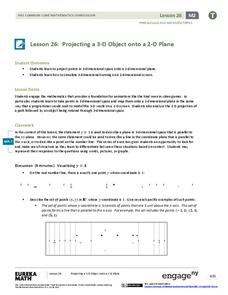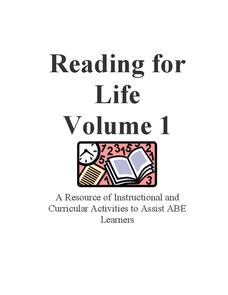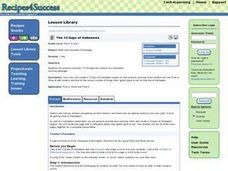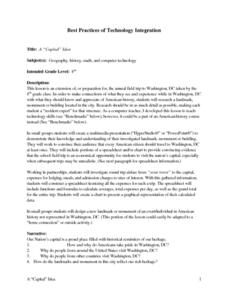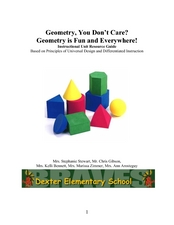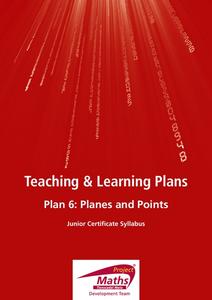Concord Consortium
Graphical Depictions
Parent functions and their combinations create unique graphical designs. Learners explore these relationships with a progressive approach. Beginning with linear equations and inequalities and progressing to more complex functions,...
Curated OER
Graphic Designing with Transformed Functions
Teach your class how to transform a graph! By identifying the domain and range of the functions, students can observe the parabola and find the vertex of the transformed graph.
EngageNY
Projecting a 3-D Object onto a 2-D Plane
Teach how graphic designers can use mathematics to represent three-dimensional movement on a two-dimensional television surface. Pupils use matrices, vectors, and transformations to model rotational movement. Their exploration involves...
Kenan Fellows
Balancing Equations Using Matrices
Matrices help solve systems of equations in chemistry, computer graphics, circuitry, probability, and more. The second lesson in a seven-part series focuses on using matrices to balance chemical equations. Pupils rely on the Law of...
PBL Pathways
Potassium-Argon Dating
Find the age of a fictional sample of rocks using a genuine approach. A well-designed lesson asks young mathematicians to use exponential modeling to analyze half-life. As a project-based learning activity, scholars communicate...
Curated OER
Radial Design Mandala
Students design original radial art designs.In this radial design lesson, students use compasses and a nature inspired idea to create radial art. Students understand the use of symmetry, balance and design shapes in continual patterns....
Curated OER
Tessel Your Way to Nagano!: Olympics, Winter Sports, Snowboarding, Graphic Design, Geometry, Math, M.C. Escher, Tessellations
Students create Post-It note fundamental regions to tesselate. They make tesselations using computer software or websites. They create a jacket design with tesselation and determine the cost of production.
Curated OER
Reading for Life
Imagine a packet packed with reading resources designed for every grade and reading level. Imagine worksheets, graphic organizers, flash cards, activities, and exercises. This is just such a packet and is well worth...
Conneticut Department of Education
Instructional Strategies That Facilitate Learning Across Content Areas
Imagine 28 instructional strategies, appropriate for all subject areas and all grade levels. Directed Reading-Thinking Activities (DRTA), Question-Answer Relationship (QAR) activities, KWL charts, comparison matrixes, classification...
Curated OER
Public Land
Young scholars examine the needs of their community for public space and determine the solutions to math problems related to planning landscape designs. They read and discuss an article from the New York Times, create their own designs...
Curated OER
The 13 Days of Halloween
Students practice counting from one to thirteen. They create a Halloween counting webpage.
EngageNY
Types of Statistical Studies
All data is not created equal. Scholars examine the different types of studies and learn about the importance of randomization. They explore the meaning of causation and when it can be applied to data.
EngageNY
Solution Sets to Simultaneous Equations (part 1)
How are systems related? Build on your pupils' previous knowledge of solving systems of equations by introducing systems of inequalities. Learners explore similarities between systems of equations and inequalities to make a strong...
Wells Fargo
Hands on Banking
Encourage middle schoolers to be proficient and knowledgeable in the economic world with a series of personal finance lessons. Focusing on banking, credit, budgets, and investing, the activities guide learners through financial...
EngageNY
TASC Transition Curriculum: Workshop 12
How can opinions slant facts? Workshop participants learn how to examine primary and secondary sources and identify the author's point of view. They also examine how visual art impacts the meaning and rhetoric of sources. Full of...
K12 Reader
The Art of M.C. Escher
Show your class one way in which art and math are related by teaching them about M.C. Escher. Class members read a brief passage and then respond to five related questions.
BBC
The Cream Cake Mystery - Seeing Patterns
A great language arts lesson designed for emerging readers awaits your class. Rhyming words are the focus. Learners play an interactive learning game on the computer that helps them to understand words that rhyme. As with all of these...
Curated OER
Pricing Your Craft Worksheet
This cross-curricular activity could be used to teach economics, business, practical math, and more. Learners pretend they are craftspeople and choose a craft to market. Using a graphic organizer and provided models, class members...
Federal Reserve Bank
Invest in Yourself
What are the different ways that people can invest in their human capital for a better future? Pupils participate in an engaging hands-on activity and analyze data regarding unemployment, the ability to obtain an education, and median...
Curated OER
A "Capital" Idea
Eighth graders prepare for a field trip to Washington, DC by researching landmark, monument, or building in Washington. They use the information in small groups to design a multimedia presentation. They include a spreadsheet that shows...
Curated OER
Geometry is Fun and EverywhereGeometry, You Don’t Care? Geometry is Fun and Everywhere
Third graders investigate shapes in our world. In this geometry lesson, 3rd graders describe plane and solid shapes and identify angles, solid objects and lines of symmetry. Students use online resources, graphic organizers and conduct...
Curated OER
The Family Tree
In this patterns practice activity, students read a 3-paragraph excerpt regarding a family tree and respond to 1 graphic organizer question and 1 short answer question.
Project Maths
Complex Number Operations
What do animated videos have to do with mathematics? Using operations of complex numbers and their representations on the complex plane, high schoolers observe how mathematics could be used to move animations. The lesson...
Project Maths
Planes and Points
Build a solid foundation on which to develop future concepts. Through a guided exploration, learners compare and contrast the characteristics of points, lines, planes, rays, and segments. They measure lengths and practice notation for...


